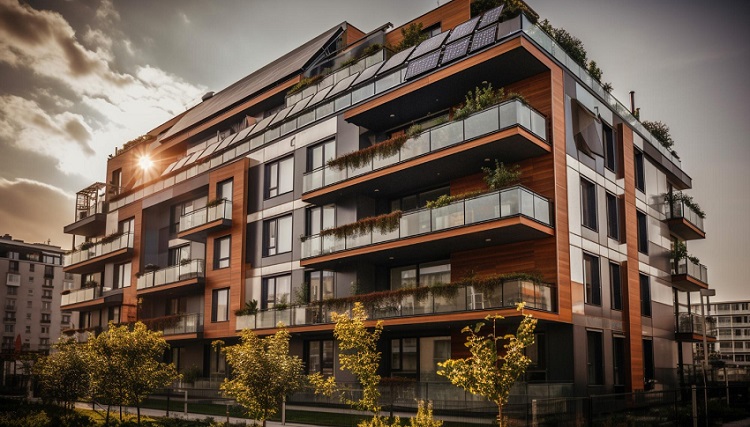
Amid Czech Republic's housing challenges, a collaborative effort by Sekyra Group, Kooperativa, and Česká spořitelna aims to build 300 affordable rental apartments, addressing demand near Prague's Opatov metro station. Concurrently, homelessness remains a concern due to lack of affordable options and rising costs. A forthcoming Building Act seeks to streamline construction permits. Meanwhile, a housing subsidy program, "Repair Grandma's House," draws controversy for potential wealth disparity. Balancing housing access, affordability, and equity remains a complex task for the nation.
Sekyra Group to build for Kooperativa and Česká spořitelna 300 rental apartments.
There is a new real estate project in Prague, Czech Republic, where Sekyra Group, Kooperativa, and Česká spořitelna are collaborating to build 300 rental apartments near the Opatov metro station. The project is scheduled to be completed by the end of the following year, and it aims to address the demand for affordable housing. The rental apartments will be allocated in cooperation with the local hospitals and the Prague 4 municipal district, targeting nurses, teachers, and police officers. The rental prices are expected to start at around 10,000 CZK per month, which is 20% lower then the current market rates in the same area.
Česká spořitelna aims to ensure the construction of at least 1,000 affordable rental apartments by 2026. The market for rental housing in the Czech Republic has grown in recent years, with double the amount of investor-owned rental apartments to 5,000+ units. More rental units are expected to be added in the coming years, with many investors and developers focusing on meeting the demand for rental housing. The Sekyra Group is also involved in other rental housing projects, including Smíchov City and Rohan City.
Over a million Czechs face problems with housing. The government is indifferent to citizens in need.
The issue of homelessness in the Czech Republic and the challenges faced by social services in addressing this problem. According to Zbyněk Stanjura, the director of the Czech Association of Supporting Housing, there is a lack of affordable housing options for individuals experiencing homelessness. The importance of providing stable housing as a means to combat homelessness and improve the overall well-being of individuals. It also emphasizes the role of social services and the need for increased funding to support housing initiatives and programs aimed at assisting homeless individuals. When it comes to housing, the increase between 2021 and 2023 has been quite alarming. We know that we currently have 1.4 million people who are facing housing problems, and between 2021-2023, monthly housing costs for Czech households has increased by up to 45 percent.
Furthermore, the impact of the COVID-19 pandemic on homelessness in the country. The economic downturn caused by the pandemic has led to an increase in the number of people at risk of losing their homes. There are calls for greater government support and investment in social services to address the issue of homelessness effectively. It also emphasizes the need to develop comprehensive strategies that not only provide immediate housing solutions but also focus on long-term support and rehabilitation for individuals experiencing homelessness.
The new construction law will speed up permits and improve housing affordability. But not before a year.
The legislation in the Czech Republic is criticized for being complex and time-consuming, resulting in lengthy delays in obtaining building permits. However, a new Building Act is set to bring significant improvements. Starting from July 1 next year, it will streamline the permit process by eliminating the need to seek approval from multiple authorities and institutions. The new law will introduce a system where opinions must be provided within specific deadlines, and failure to do so will be considered as consent. This will expedite the permit process and reduce waiting times.
Appeals will also be handled more efficiently, with the superior building authority making a decision instead of sending the matter back to the lower authority. Additionally, the new law will prevent neighboring landowners from revoking their consent during the process, reducing complications for investors. Planning contracts will be more difficult to terminate by new municipal management, ensuring stability for developers. The option of separate zoning and building permits will be abolished, and electronic submission of applications will be introduced. The new law aims to make the permitting process faster, reduce costs, and improve housing affordability, but its full effects may take some time to be seen.
The new construction law will speed up permits and improve housing affordability. But not before a year.
The subsidy program called "Repair Grandma's House" in the Czech Republic, which has received criticism for favoring the rich and exacerbating social inequalities, is a program offering generous support for house repairs and insulation, with subsidies of up to one million crowns for insulation and additional amounts for various energy-efficient upgrades. The subsidy covers a significant portion of the reconstruction costs, and it is expected to contribute to reducing greenhouse gas emissions. The program has been praised for its potential economic and energy-saving benefits.
However, sociologist Martin Lux criticizes the program, stating that it fails to address social inequalities and primarily benefits those who are already wealthy. He argues that young people starting their careers, who do not inherit houses, are excluded from the program. The Czech subsidy program with those in neighboring countries like Germany and Austria, highlighting differences in funding amounts and eligibility criteria. Deputy Prime Minister Ivan Bartoš has called for a revision of the program, expressing concerns about its implementation. The program has been considered controversial due to its potential to widen social disparities.
Zdroj: e15.cz, kurzy.cz, seznamzpravy.cz


